- Home
- Hammond Innes
The Doomed Oasis
The Doomed Oasis Read online
THE DOOMED OASIS
In the baking heat of the Persian Gulf the Arabs, whose ancestors roamed the lands are wary of the Europeans. Only the legendary Arabist, Charles Whitaker, is always welcome in their camps. It is he who helps maintain the uneasy peace between hostile neighbours.
To this barren land comes Whitakers illegitimate mate son, David, raised on the tough Cardiff waterfront, whose love for the desert and for the tribes that inhabit it becomes as fierce as his father’s.
But the two men see the land’s future in very different ways - and neither will tamely submit to the other. The confrontation between father and son reaches its explosive climax in the treacherous sands of the doomed oasis.
Hammond Innes
The Doomed Oasis
To The Royal Air Force and the Officers of the Trucial Oman Scouts
With my admiration for the work they do in circumstances of difficulty, often of great hardship; and with my appreciation of their cooperation, without which this book could not have been written.
I would like to express my appreciation of the help I have received from Neil Innes during the actual writing of The Doomed Oasis. He was Minister of External Affair to the Sultan of Muscat at the time I was journeying in Arabia; not only did he check the final typescript for me, but at various stages of the writing I benefited greatly from his knowledge. I should perhaps make it clear, however, that I have ignored his advice on the spelling of two Arab names, in particular believing that my own spelling of Makhmud would be more helpful in conveying the sound of that name than the correct Mahmud. Both the sheikhdom of Saraifa and the emirate of Hadd are, of course, entirely imaginary Arab States.
Cold voices whisper and say -
‘He is crazed with the spell of far Arabia,
They have stolen his wits away.’
WALTER DE LA MARE
I. THE COURT OF FIRST INSTANCE
Call Aubrey George Grant!
Aubrey George Grant!
The moment had come. My mouth felt suddenly dry. The Court was waiting and I knew the ordeal ahead of me was a long one. And at the back of my mind was the knowledge that in telling the truth, the whole truth, I might convict an innocent man. I felt the touch of her hand on mine, the quick pressure of her fingers, and I rose to my feet, the sweat sticking the shirt to my back as I followed the attendant. The doors of the courtroom stood open. I checked, a moment’s hesitation in the entrance; the place was packed, the atmosphere tense with expectancy.
Quickly I walked down through the Court, the setting familiar to me, a part of my working life; only my role had changed. It was the first time I had entered Court as a witness. I kept my eyes on the Judge, on the pale London face above the tropical suit. He had been specially appointed to try this unusual case and he looked tired after the long flight, shrunken almost, the suit too large; without the scarlet robes he seemed less awe-inspiring and the Law robbed of some of its majesty. Counsel, too, looked ordinary without wig and gown, and the courtroom itself-all open shirts or pale, loose-fitting jackets, a scattering of Bahrainis in flowing Arab robes. The Code of Criminal Procedure in this Court was based on the Indian Penal Code, yet in essence it was the same Law, and as I moved towards the witness box, the Judge leaned slightly forward, peering at me short-sightedly, his hands clasped together.
Once in the box I faced the crowded courtroom; no longer a mass of unidentifiable humanity, but a sea effaces all lifted to stare in silent expectation waiting for the full story which they now knew I alone could give.
I had been called as a witness, not for the Defence, but for the Prosecution. Every word I uttered would be taken down and rushed out of Bahrain by telephone and radio; and thousands of miles away the metal drums of the presses would pour the story out to waiting millions. Representatives of almost every London newspaper were here and half the world’s press, packed so tight in this improvised courtroom that they could hardly breathe. And outside in the broiling, humid heat were the photographers and the newsreel men and the television recording units, and at the airfield across the water on the island of Muharraq, special planes waited to fly the pictures that would be flashed on the screens of television sets in the homes of countless people.
Here and there in that sea effaces below me were people I recognized, people who had taken part in the events I was going to have to describe. There was Sir Philip Gorde, director of Gulfoman Oilfields Development, looking old and battered, his heavy-lidded eyes half-closed; and beside him, Erkhard, very neat and cool. Colonel George was there and Captain Berry, easily distinguishable, smart in their uniform of short-sleeved khaki shirts and well-creased khaki longs. Sue had followed me in, and it came as something of a shock to me to see that she had seated herself next to that strange, half-Arab, half-French girl who called herself Tessa. Captain Griffiths, too, his beard neat and pointed - a reminder of Cardiff and the visit that had started it all.
Raise your right hand. I did so and my gaze shifted involuntarily to the prisoner in the dock. He was watching me and for a moment our eyes met. I thought he smiled, but I couldn’t be sure. I had a sense of surprise, almost of shock. Perhaps it was the tropical suit, the neatly brushed hair; he looked a different man. There was only the arm still in a sling to remind me that this was the man whose singleness of purpose had captured the world’s imagination. The Book thrust into my hand disrupted my thoughts.
Repeat after me. My lips were dry. I had turned away from him, but I knew he was still watching me. I swear by Almighty God.
‘I swear by Almighty God—’
That the evidence I shall give the Court.
‘That the evidence I shall give the Court—’ And as I said it I was wondering how the public at home would react to what I was going to have to tell the Court. Until today they would have had quite a different picture of the prisoner - a mental picture culled from garbled versions of his exploits heard over radio and seen on television, read in newspapers and periodicals, a colourful, larger-than-life picture entirely at odds with the neat figure standing alone there in the dock accused of murder.
Shall be the truth.
‘Shall be the truth—’ They should never have brought the case. He was a national hero and whatever the verdict of the Court, the public’s reaction would be a violent one. But would they be for him or against him?
The whole truth. ‘
The whole truth—’
And nothing but the truth.
‘And nothing but the truth.’
Your full name please?
‘Aubrey George Grant.’
And then Counsel for the Crown, on his feet and facing me: ‘You are a solicitor by profession I believe?’
‘Yes.’
‘Were you called upon to act for the prisoner on his arrest?’
‘Yes.’
‘When did you cease to act for him?’
‘As soon as I realized I was being regarded as a material witness for the Prosecution.’
‘You have acted for the prisoner before. I think?’
‘Yes.’
‘When was that?’
‘Just over four years ago.’
The Judge’s voice suddenly interjected: ‘How long ago?’ His hand was cupped to his ear.
‘Four years, my Lord.’
The Prosecution moved a step nearer, hands hung in the lapels of his jacket, the skin of the face cool as parchment in the humid heat. ‘I will ask the witness to take his mind back now to the afternoon of March twenty-first four years ago. On that afternoon you received a telephone call from a Mrs Thomas of Seventeen, Everdale Road, Cardiff. And as a result of that telephone call you went to that address.’
‘Yes.’
‘Perhaps you will now tell the Court in your own wor
ds what happened—’
II. THE WHOLE TRUTH
1. Escape to Saraifa
Everdale Road was in the Grangetown district of Cardiff. It was one of those terrace streets of grim Victorian brick, roofs hunched against the wet west wind, windowed eyes peering blindly for the view of river and sea that was blocked by other similar houses. Two streets away and you could look across the Taff to the litter of cranes, the glimpse of funnels that marked the Bute Docks. It always depressed me, this area of Cardiff; it lacked the squalid colour of Tiger Bay, the bridge across the Taff seeming to cut it off from the toughness and sense of purpose that gave a lift to the real dock area. The street was deserted except for one car, a small black saloon. It stood outside number seventeen, and as I drew in to the kerb behind it, I glanced quickly at the house. There was nothing to distinguish it from the others, except the number. A light was on in one of the downstairs rooms. Neat lace curtains were looped back from the windows.
I got out and rang the bell, wondering what I was going to find inside. Trouble of some sort; nobody ever called me to this district unless they were in trouble. And the voice over the phone - it had been a woman’s voice, low and urgent, near to panic. I glanced at my watch. Four-thirty. The light was already going out of the cloud-filled sky. A slight drizzle gave a black shine to the surface of the street.
Across the road a curtain moved; hidden eyes watching, something to gossip about. I knew the black saloon parked at the kerb. It was Dr Harvey’s. But if there was death in the house then the curtains would have been drawn. My hand was reaching out to the bell-push again when the latch of the door clicked and voices sounded:’ … nothing else I could have done, Mrs Thomas. A case for the police … you understand, I hope. And the ambulance will be here any minute now.’ The door was flung open and Dr Harvey bustled out, almost cannoning into me. ‘Oh, it’s you, Grant.’ He checked in mid-flight, black bag gripped in his hand, no overcoat as usual, a young, fair-haired, very serious man in a perpetual hurry. ‘Well, I suppose you’ll be able to make some sort of a case out of it in court. The boy’s certainly going to need legal advice.’ There was no love lost between us. We’d tangled over medical evidence before. ‘Got to deliver a baby now. Can’t do anything more for that chap.’ And he almost ran out to his car.
‘Mr Grant?’ The woman was staring at me uncertainly.
I nodded. ‘Of Evans, Jones & Evans, solicitors. You telephoned me a little while back.’
‘Yes, of course.’ She held the door open for me, a small neat-looking person of between forty and fifty with deep-set, shadowed eyes. Her hair was greying, swept straight back from the forehead, the face dead white against the dark background of the passage.’ Will you come in, please.’ She shut the door behind me. ‘Dafydd didn’t want me to call you. But I thought you wouldn’t mind as your firm it is that handles that little allowance for me.’
It was the first I knew we acted for her in any way. I thought she’d phoned me because I’m willing in certain circumstances to take a case without a fee. ‘What’s the trouble, Mrs Thomas?’ I asked her, for she was standing motionless as though unwilling to let me go further into the house.
She hesitated, and then almost in a whisper, ‘Well, it’s Dafydd really, you see. He came back - and then… . Oh dear, it’s all so difficult to explain.’ Now that she had shut the street door, I could see no more than the outline of her face, but her voice, trembling to a stop, told me she was having to fight to keep control of herself. She was frightened, too. ‘I don’t know what he’ll do,’ she whispered. ‘And Sue not here. Sue could always manage him when I couldn’t.’
‘Sue is your daughter, is she?’ I knew it would steady her if I asked questions.
‘Yes, that’s right. She works at the Infirmary, but I didn’t phone her because she’d never get back here in time.’
‘And David - that’s your husband?’
‘No, Dafydd’s my son. He and Sue are twins. She understands him somehow.’
‘I see, and he’s in some sort of trouble?’
‘Yes.’ And then she added hastily, ‘He’s not a bad boy, not really.’ She drew in her breath quickly as though gathering herself together. ‘If I hadn’t written to him like I did, it wouldn’t have happened. But I’d had about all I could stand, you see, and then he came home and there was a bit of a row and Mr Thomas, he said things, you see, that he shouldn’t have done, and suddenly they were hitting out at each other. It wasn’t Dafydd’s fault. He’d had a terrible shock, poor boy. And Mr Thomas, he’d had a few beers, and then—’ She sucked in her breath again as though gulping for air. ‘Well, then he had this stroke, you see, and I called Dr Harvey right away and then I telephoned you because I knew if meant trouble for Dafydd.’ It had all come out in a rush as though she couldn’t contain it any longer. ‘My husband looked so bad, you see,’ she added lamely, ‘and I didn’t know what would happen. I just didn’t know what to do, Mr Grant - not for the best, as you might say. And then Dr Harvey came and he said there wasn’t much hope for him and he phoned the police so it’s glad I am that I called you now. You’ll know what to do and what Dafydd should say to them. He’s not a bad boy,’ she repeated in a voice that was suddenly on the defensive. ‘Just a bit wild you know.’ And she added quickly, ‘Mr Thomas hit me you see.’
There was a family row, in other words?’
‘Yes. Yes, you could call it that. But I wouldn’t like you to think that because Mr Thomas was a bit of a drinker there was anything wrong between us. He’s good at heart, you know.’
‘And he’s had a stroke you say?’
‘Yes, that’s right. That’s what Dr Harvey called it.’ She seemed to have got a grip of herself. ‘Come in now won’t you, Mr Grant. He’s lying on the couch in the parlour. And Dafydd’s there too. I expect you’d like a word with him. But don’t try and rush him, please,’ she added in a whisper, and I got the impression she was afraid of her son. ‘He needs a bit of handling, you see. And he’s had a shock as I say - a dreadful shock.’ She pushed open the door and stood back for me to enter. This is Mr Grant, Dafydd - Mr Grant the lawyer.’
The room was lit from the ceiling, a stark, glaring light without compromise. It showed me a couch with the body of a man lying on it. He was in his shirt sleeves, the brass gleam of a stud showing where his shirtband had been loosened. His eyes were closed and he was breathing with difficulty, his rather heavy, florid features fallen away so that the bone showed through the flesh. The nose had the veined look of a heavy drinker. Close against the gas fire, one elbow on the mantelpiece, leaned a youth of about twenty. He was rather over-dressed in a jacket with a lot of elaborate pockets and tucks and a pair of tight-fitting trousers. His face was as white as his mother’s; the same features, too, except that the nose was more beaky, the jaw stronger. He didn’t shift his position as I entered the room, didn’t even look up. He was staring down at the gas fire and his immobility was oddly disconcerting.
Close by his feet was a litter of broken glass from the smashed front of one of those over-pretentious china cupboards. The mahogany beading as well as the glass had been broken in the struggle and the bric-a-brac with which the cabinet had been filled, mostly white china souvenirs from seaside towns, lay in confusion on the worn carpet. A vase, too, lay where it had fallen from the table by the window. It was unbroken, and beside it lay a much-thumbed photograph album spilling press cuttings. There was something a little macabre about the whole room; nothing cleared up after the struggle and the father lying there half-dead on the couch with a blanket tucked round him; and the mother and son standing, facing each other, absolutely still.
I could feel the tension between them. It wasn’t hate, but it was something just as strong, an emotion so violent that the man on the couch, myself, the state of the room didn’t exist for them.
‘Well, now.’ I addressed the boy, my tone as matter-of-fact as I could make it in that sort of atmosphere. ‘Suppose you tell me what happened.’ But it was like
talking to a brick wall. He had a sullen, withdrawn look.
‘I’ve told you what happened,’ his mother said in a whisper.
‘Quite so, Mrs Thomas, but I’d like to hear it from your son.’ She looked deathly tired. I turned to the boy again. ‘You’ve had a shock,’ I said gently. ‘It’s natural you should be a bit dazed by what’s happened… . ‘ But even as I said it I knew the boy wasn’t dazed. The knuckles of the hand that gripped the mantelpiece were white with pressure and there was a muscle working at the back of the jaw. He was holding himself in like a boiler under pressure and I wasn’t sure how best to handle him. His gaze had shifted now and he was staring at his mother. I felt sorry for the woman. ‘Listen to me, young man,’ I said. ‘I understand Dr Harvey has called the police. They’ll be here any minute now. If you want me to act for you, then you’d better start talking now, before they arrive.’
A slight movement of the shoulder, that was all the answer he made. It wasn’t a shrug, more a muscular twitch as though he was impatient for me to go. ‘Mr Grant is only trying to help, Dafydd.’
‘Dammo di! What the hell good is a lawyer man now? It’s done, and arguing about it won’t alter anything.’ His voice trembled. And then he turned on me, a flash of pale amber eyes, and told me to get out, the words violent, laced with obscenities.
‘Dafydd!’
But she was frightened; she had no control over him. ‘All right,’ I said, and I moved towards the desk where I’d left my hat. ‘I hope for your sake,’ I added, ‘that your father’s condition isn’t serious.’
‘He’s not my father.’ The words flashed out from between clenched teeth. ‘I’d have killed him if he’d been my father.’ I turned to find his pale eyes fixed on his mother. ‘1 mean that, Ma. I swear I’ll kill the swine -if lean ever find him.’ The words had a violence and a bitterness that appalled me.
‘He’s not himself,’ his mother murmured. ‘He doesn’t know what he’s saying.’ Her hands were plucking at the apron round her middle and her brown, doe-like eyes were wide with fear. She knew he’d meant it.

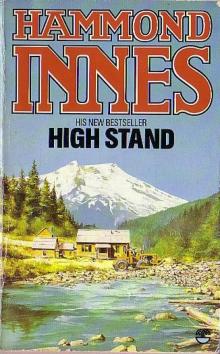 High Stand
High Stand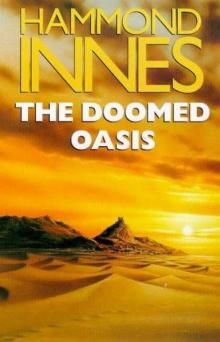 The Doomed Oasis
The Doomed Oasis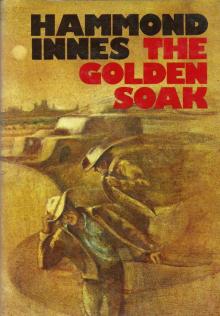 Golden Soak
Golden Soak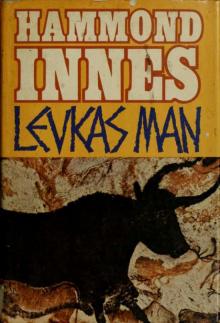 Levkas Man (Mystery)
Levkas Man (Mystery)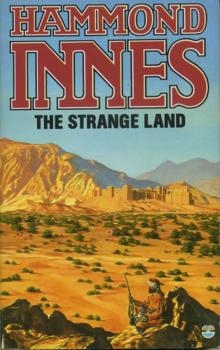 The Strange Land
The Strange Land Dead and Alive
Dead and Alive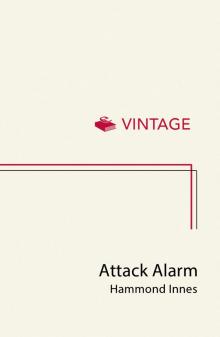 Attack Alarm
Attack Alarm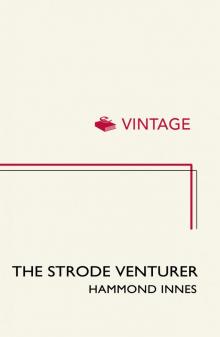 The Strode Venturer
The Strode Venturer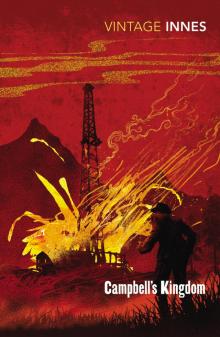 Campbell's Kingdom
Campbell's Kingdom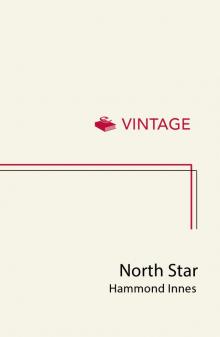 North Star
North Star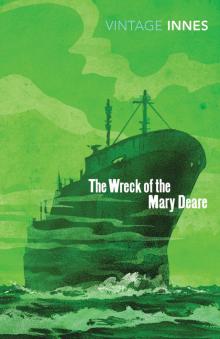 The Wreck of the Mary Deare
The Wreck of the Mary Deare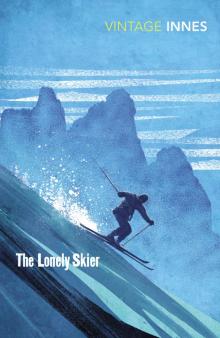 The Lonely Skier
The Lonely Skier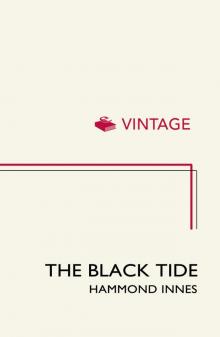 The Black Tide
The Black Tide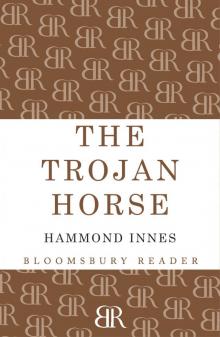 The Trojan Horse
The Trojan Horse Medusa
Medusa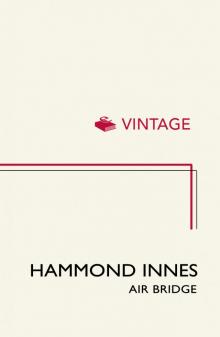 Air Bridge
Air Bridge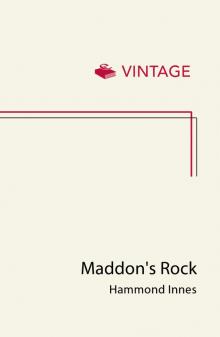 Maddon's Rock
Maddon's Rock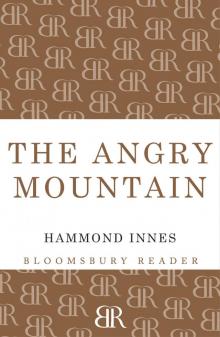 The Angry Mountain
The Angry Mountain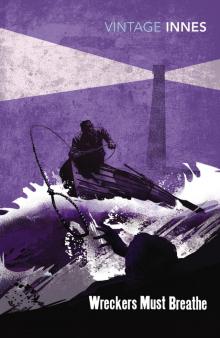 Wreckers Must Breathe
Wreckers Must Breathe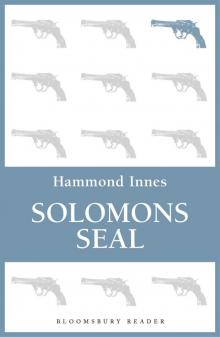 Solomons Seal
Solomons Seal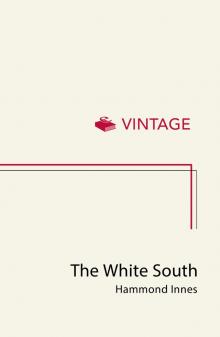 The White South
The White South